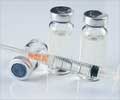The US FDA approves a immunotherapy drug, N-803, for BCG-unresponsive non-muscle invasive bladder cancer, suggested to be used in conjunction with BCG.

FDA approves nogapendekin alfa inbakicept-pmln for BCG-unresponsive non-muscle invasive bladder cancer
Go to source). This medication is indicated for adult patients diagnosed with BCG-unresponsive non-muscle invasive bladder cancer (NMIBC) accompanied by carcinoma in situ (CIS) and may also be used in cases with or without papillary tumors. The FDA has recommended the use of Bacillus Calmette-Guérin (BCG), an immunotherapy drug, in conjunction with Anktiva for optimal treatment outcomes.
The positive outcome as seen in the efficacy and safety of the QUILT 3.032 clinical trial study led to this approval.
Dr. Karim Chamie, associate professor urology at the David Geffen School of Medicine at UCLA and a researcher at the UCLA Health Jonsson Comprehensive Cancer Center, led the QUILT 3.032 clinical trial (2✔ ✔Trusted Source
IL-15 Superagonist NAI in BCG-Unresponsive Non-Muscle-Invasive Bladder Cancer
Go to source).
The results of the phase 2/3 trial were shared during the annual meeting of the American Society of Clinical Oncology in 2022 and published in the journal NEJM Evidence. Chamie, the lead researcher for the trial, stated that this combined therapy led to extended overall survival and demonstrated superior efficacy and safety compared to alternative treatments for BCG-unresponsive non–muscle-invasive bladder cancer.
Chamie commented, “The FDA approval of N-803 heralds a new era in the management of BCG-unresponsive non–muscle-invasive bladder cancer,”.
Chamie further added “By leveraging the body's immune system to mount a targeted attack against cancer cells, N-803 offers a compelling alternative for patients who have exhausted conventional treatment options. What makes this really remarkable, is its ability to spare patients from invasive procedures, like a cystectomy, significantly enhancing the quality of life for patients.”
‘The US FDA approval of immunotherapy-boosting drug N-803 is now a promising future for patients with BCG-unresponsive non–muscle-invasive bladder cancer. #bladdercancer #immunotherapy #medindia’





Advertisement
Earlier Therapy Plan For Bladder Cancer and Why It Did Not Work?
Approximately 80% of newly diagnosed cases of bladder cancer are classified as non-muscle invasive bladder cancer. These are located in the inner lining of the bladder without spreading to the bladder wall. Patients diagnosed with this form of cancer typically undergo a surgical procedure to eliminate the tumor, followed by therapy using BCG, a bacteria-based immunotherapy, directly administered into the bladder. This therapy induces an inflammatory reaction in the bladder, aiding in the prevention of cancer recurrence.Yet, despite undergoing this therapy, there is a possibility of cancer recurrence, and a considerable number of patients do not exhibit positive responses to subsequent BCG treatment, thereby limiting the available treatment options. In certain cases, surgical intervention may be necessary to completely remove the bladder, which exposes patients, particularly older individuals, to notable risks such as bleeding, kidney complications, and infections.
Advertisement
How Does the New Therapy Work?
The QUILT 3.032 trial assessed the impact of incorporating the experimental medication N-803 into the existing therapy plan to determine its potential to enhance the efficacy of BCG.The drug, N-803, researched and created by ImmunityBio, is a protein that aids in stimulating the body's immune cells to combat cancer by enhancing the growth and activation of natural killer cells and CD8+ T cells, both of which are vital for immune system's defense against cancer cells.
Advertisement
Details of the Clinical Trial
The trial was funded by ImmunityBio, Inc., a company that develops immunotherapy drugs.The clinical trial included 171 participants (81% male with a median age of 72) diagnosed with non–muscle-invasive bladder cancer who exhibited poor response to BCG treatment from various clinical sites nationwide. Among these, the UCLA Health team registered 28 participants, establishing UCLA as the leading enrollment center. These participants were subsequently categorized into two groups: one with carcinoma in situ and the other with papillary disease.
In the group of patients with carcinoma in situ, a complete response was observed in 71% of individuals for 47 months. This indicates that they no longer showed any signs of the disease or experienced any symptoms of cancer. The duration of this response had a median value of 26.6 months.
Another finding was that more than 90% of patients were able to avoid undergoing cystectomy, at 24 months, cystectomy involves the surgical removal of the bladder. The other positive outcome of the trial was that all participants in the study (100%) were still alive after a two-year follow-up.
In the second group of patients with papillary disease, 57% of patients remained free of the disease after 12 months, while 48% remained disease-free after 24 months. In this set of patients too, 94% in this group were able to avoid cystectomy.
Chamie commented, “The treatment was particularly effective for carcinoma in situ patients, with a high complete response rate and long-lasting response,”.
“Even for papillary disease, the treatment showed good results in keeping the cancer from coming back and avoiding the need for cystectomy. Overall, the treatment was safer and more effective than other options available for BCG-unresponsive non–muscle-invasive bladder cancer.”
This US FDA approval is a significant milestone in the treatment of BCG-unresponsive non-muscle-invasive bladder cancer, offering hope and positive results to patients.
References:
- FDA approves nogapendekin alfa inbakicept-pmln for BCG-unresponsive non-muscle invasive bladder cancer - (https://www.fda.gov/drugs/resources-information-approved-drugs/fda-approves-nogapendekin-alfa-inbakicept-pmln-bcg-unresponsive-non-muscle-invasive-bladder-cancer)
- IL-15 Superagonist NAI in BCG-Unresponsive Non–Muscle-Invasive Bladder Cancer - (https://evidence.nejm.org/doi/full/10.1056/EVIDoa2200167)
Source-Medindia















